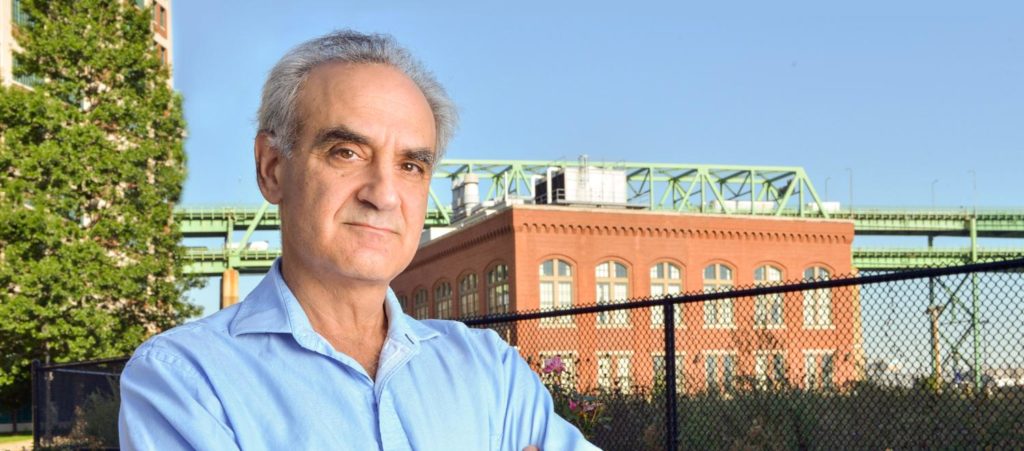‘Genius grant’ recognizes alumnus’ environmental work in health care

Gary Cohen ’78 is a genius.
That’s what the MacArthur Foundation insists.
Last year, Cohen was awarded a MacArthur Fellowship and its accompanying monetary prize — commonly known as a “genius grant.”
“I have a lot of trouble with this genius thing,” he admits. “I’m not a genius. I had a good idea and I’ve worked hard, and it’s taken off, so that’s fantastic. There are a lot of good people doing good things and I’m really fortunate to have been singled out for my work.”
Cohen’s good idea was to help hospitals and health care facilities become more environmentally responsible. In the 1990s, according to the Environmental Protection Agency, medical waste incinerators were the largest source of dioxin emissions in the country, and a significant source of mercury pollution.
“It was crazy,” Cohen says. “How could the health care sector, which is committed and devoted to healing, itself be poisoning the very communities it serves?”
His efforts were the genesis of Health Care Without Harm (HCWH), now a global organization that develops strategies for hospitals and health systems to address their environmental footprints.
“We worked with Beth Israel-Deaconess Hospital in Boston to show how they could eliminate mercury thermometers, and that gave other hospitals in Boston the sense of how they could do it, too. We got all the hospitals in the city to eliminate mercury, and then we took that on the road,” Cohen says.
His travels took him across the United States, and then around the world, where he convinced health care providers that they could measure temperature and blood pressure without mercury. Ultimately, his work led to the Minamata Convention on Mercury and a treaty, signed by more than 140 nations, phasing out all mercury-containing measuring devices by the year 2020.
“When we started all of this, the conversation was, ‘We’ve got all of this toxic waste, where should we put it?’ which was the wrong question to ask,” Cohen says. “Now, it’s shifted to, ‘How can we completely transform our economy so it’s based on principles of sustainability, green chemistry and renewable energy that actually will be good for the economy and also good for people’s health?’ It’s not a trade-off.”
HCWH strategies help hospitals and health care systems become more energy-efficient and invest in renewable energy, eliminate toxic chemicals from their facilities to improve safety for their patients and employees, transform their food-purchasing practices to serve healthy, sustainably grown food and purchase more environmentally responsible products to move the market toward greater sustainability. A global network lets hospitals around the world learn from each other.
Cohen had an appreciation for the power of positive disruption even during his Clark days, as a philosophy major. At his commencement ceremony, without permission, he went onto the stage and gave a speech. He carried with him a trophy, representing the achievements of his fellow graduates, which was engraved with a guiding principle: “Education is what you have left over after you’ve forgotten everything you’ve learned.”
“The concept,” he explains, “was that a really good college education will teach you how to think and how to be analytical. You won’t remember specific content or dates, but you’ll remember how to analyze a problem. That’s what was so valuable about the Clark education.” (The trophy was ceremoniously deposited at Moynihan’s Pub, where it remains to this day.)
Following graduation, Cohen connected with classmate and good friend John O’Connor ’78, who had started the National Toxics Campaign. The two Clarkies traveled throughout the country and met with families living near Superfund sites, incinerators and factories, “mostly mothers and fathers sitting around kitchen tables,” Cohen says, “wondering why their kid had a rare form of cancer, why another child is waking up choking at night, why the water tastes bad.”
Cohen worked alongside O’Connor for about a decade, providing technical and organizing assistance to people around the country. They wrote a guidebook, “Fighting Toxics,” that is still available online. (Amazon offers it as an e-book.)
“What I’ve found over the last thirty years is that people all over the world are fighting this same struggle, defending their communities against pollution. There’s a global movement of people who are trying to save the planet, their communities, and their health,” Cohen says.
The challenge for the health care industry is to become a leader on climate change, he says. The most powerful way to motivate people to act is to talk about things that matter to them, “which is their health, and the health of their families,” Cohen says. “I feel like we’re at an early stage of starting to build the narrative.
“That will keep us busy for the next 30 years.”
This story was originally published in CLARK magazine, spring 2016.


